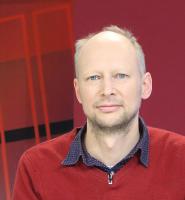Wilson Robert J.
- Departamento: Biogeografía y Cambio Global
- Dirección física: Museo Nacional de Ciencias Naturales
- Teléfono: 914111328 extn 443673
- Email: rjwilson@mncn.csic.es
- Página web externa: https://robwilsonmncn.wixsite.com/robwilsonmncn-1
- Número ORCID: 0000-0003-4477-7068
- Palabras clave:

Investigación
Climate change is a major challenge for biodiversity conservation, especially in the face of additional threats such as habitat loss and fragmentation. My research focuses on ecological responses to these interacting drivers, testing how climate and habitat availability influence the habitat associations, population dynamics, and ultimately the distributions and conservation status of species. The distributions and diversity of species at their range margins, over environmental gradients, and in fragmented landscapes form the model systems.
I have worked mainly (but not exclusively) on butterflies, and aim to apply the understanding gained about the mechanisms driving ecological responses to environmental change to propose guidelines for conservation - and in particular for adapting conservation to climate change.
My research is primarily field-based, and takes a multi-scale approach: from fine-scale studies of microclimate, population dynamics, habitat use and dispersal; through landscape-scale research into metapopulation dynamics (colonization and extinction); to large-scale patterns and processes of distribution change. I am also interested in how natural history collections can help provide evidence and understanding about the effects of global change on biodiversity, and insects in particular.
I became a permanent scientist at Museo Nacional de Ciencias Naturales (MNCN-CSIC) in 2018. I obtained the project Identifying climate change refugia using Iberian mountain butterflies (RTI2018-096739-B-C21; MCIU/AEI/UE, 2019-2022) to test climate change and distribution shifts in four mountain ranges using new and historical field data. We have shown that regions of high topographic variation have buffered changes in butterfly communities against recent warming. In the same system I am now researching the capacity of range shifts by multiple species to cause biodiversity tipping points, with the project Detecting Abrupt Responses to climate change using the butterflies of Mountain elevation gradients (PID2021-126293OB-I00; MCIU/AEI/UE, 2022-2025), and as a project partner for the UK grant Predicting sudden and widespread biodiversity loss on a rapidly warming planet - when and where does biology change things? (NE/W006618/1; NERC, 2022-2025). I am also PI with Markus Bastir (MNCN-CSIC) on the project Digitization to adapt an entomology collection to the environmental challenges of the 21st century (TED2021-130795B-I00, MCIU/AEI/UE, Proyectos Orientados a la Transición Ecológica y a la Transición Digital, 2022-2024).
I combine research with academic roles in teaching, training and administration. At the MNCN-CSIC I am Deputy Director of Scientific and Professional Training since 2021. In this role I am developing initiatives to promote research and wellbeing among >100 pre- and post-doctoral researchers. I am Editor-in-Chief of the journal Ecological Entomology since 2022 (Associate Editor since 2018), and Associate Editor for Proc R Soc B since 2014.
Current research group colleagues are:
Hugo Álvarez García de Cano - Juan de la Cierva Postdoctoral Fellowship
Guim Ursul Colomé - FPI doctoral research studentship
Mario Álamo del Olmo - JAE Intro research internship
Marta Goded Blanco - MSc project student (TFM)
Lourdes López Ruiz - Undergraduate project student (TFG)
Otros investigadores del departamento
- Rey Simo Ana
- Acuña Míguez Belén
- Álvarez Hugo Alejandro
- André Ferreira Mira
- Aragon Carrera Pedro
- Bastos Araújo Miguel
- Benítez López Ana
- Bravo-Oviedo Andrés
- Camacho Luis
- Concepción Cuevas Elena Daniela
- Diaz Esteban Mario
- Gómez-Vadillo Mónica
- González Trujillo Juan David
- guim.ursul
- Herrando Pérez Salvador
- Hortal Joaquín
- Jiménez Valverde Alberto
- LoboJorgeM
- Matias Miguel
- Mendoza Manuel
- Merino Robert Nicolàs
- Mingarro López Mario
- Ronquillo Ferrero Cristina
- Sánchez Albert Adrián
- Tarjuelo Mostajo Rocío
- Valladares Ros Fernando
- Zarzo Arias Alejandra





